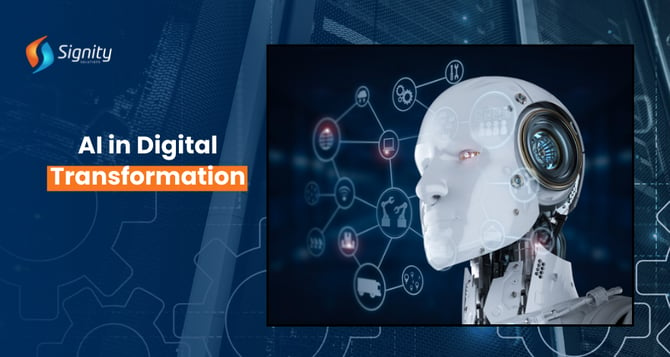The Role of AI in Digital Transformation
AI-driven digital transformation has become a game changer for businesses across all industries. Get ready to explore its various technologies, benefits, and implementation steps to boost your business growth.

The use of Artificial Intelligence can be seen in various aspects of the business. AI technologies are crucial elements for businesses to bring digital transformation.
They help optimize workflows, enhance customer experiences, and streamline decision-making processes. By integrating AI into existing systems with AI development services, companies can unlock new growth opportunities and stay competitive.
Furthermore, AI-driven tools enable real-time insights and predictive analytics, making organizations more agile and data-driven.
This blog will help you understand the benefits of AI digital transformation, the role of various technologies, steps to build a digital transformation AI strategy, and implementation challenges.
Key Takeaways
- AI plays a pivotal role in digital transformation, optimizing workflows, enhancing customer experiences, and enabling data-driven decision-making.
- Businesses can achieve operational efficiency, hyper-personalized customer experiences, and predictive insights to stay competitive with AI.
- Building a successful AI strategy involves defining objectives, assessing capabilities, prioritizing use cases, and fostering organizational change to maximize ROI.
- Ensuring data security, managing ethical concerns, reskilling the workforce, and addressing cost implications are critical to successful AI adoption.
Introduction to AI and Digital Transformation
In this tech-led world, Artificial Intelligence is revolutionizing how businesses work and innovate. Integrating digital technology into existing business systems on this AI journey helps optimize business processes and enhance business areas.
Through AI transformation, businesses can adopt a strategic approach to leverage technologies like Machine Learning and Generative AI. It enables companies to make smarter decisions and foster groundbreaking innovations.
This approach is crucial not only to streamline operations but also to deliver greater value to customers in order to ensure they remain competitive.
Benefits of AI in Digital Transformation
With the evolution of technology, Artificial Intelligence plays a crucial role in digital transformation. The image below shows the growth of the AI market size in the coming years.

Some of the notable benefits of AI-driven digital transformation include:
1. AI Transformation Strategy
Businesses can integrate AI technology with their company's objectives through an AI transformation plan, opening the door to more efficient operations and intelligent decision-making.
With AI digital transformation, businesses can encourage innovation and attain scalable growth. Prioritizing investments in AI technologies that yield the highest return on investment is another benefit of this technique.
2. AI-Guided Sales and Predictive Analytics
Digital transformation AI helps sales teams find high-value prospects and close deals more quickly using AI-guided sales as it uses predictive analytics to estimate customer demands and behavior.
Further, sales teams can use these insights to tailor their proposals, which increases conversion rates. AI can also spot upselling and cross-selling opportunities that might otherwise go unnoticed.
3. Operational Efficiency and Automated Administrative Tasks
Artificial Intelligence digital transformation greatly reduces human workloads by automating administrative operations, freeing up staff members to concentrate on strategic endeavors, and increasing overall operational efficiency.
Advanced AI tools can handle tasks like scheduling, reporting, and data entry with ease. It increases efficiency by reducing human mistakes and expediting repetitive tasks.
4. Data-Driven Decision-Making with Real-Time Insights
Businesses can react quickly to changes in the market and client demands with the help of AI-powered decision-making tools, which offer real-time insights and data-driven decision-making skills.
Large datasets are immediately processed by these technologies, which reveal patterns and trends that enable well-informed plans. Businesses can also use real-time analytics to reduce risks and take advantage of new opportunities.
5. Hyper Personalized Customer Experiences
Another major benefit of AI and digital transformation is that it enables personalized experiences. Through the analysis of customer behavior data and the customization of interactions to individual preferences, AI excels at providing hyperpersonalized customer experiences.
At least 35% of companies identify enhancing customer experience as the main goal of their digital transformation plan. Targeted information and tailored recommendations increase client loyalty. Additionally, AI-powered customization improves the consumer experience at several touchpoints, increasing retention and satisfaction.
6. Enhanced Personalization Capabilities for Competitive Advantage
Brands can now quickly take a lead in the market. By developing distinctive and captivating client journeys, businesses can use AI's sophisticated customization capabilities to stand out in competitive marketplaces.
This benefit enables brands to address certain requirements and establish a deeper connection with their audience. AI also guarantees that outreach and marketing initiatives are more pertinent, which improves results.
7. Improved Forecasting Through AI-Powered Tools
In the highly competitive market, businesses need the latest techniques for growth. Predictive analytics and AI systems provide precise forecasting, allowing companies to stay ahead of the competition and foresee market trends.
These insights enable businesses to modify their plans proactively. Businesses may optimize inventories, cut expenses, and increase profitability by forecasting future demand and client preferences.
AI Technologies in Digital Transformation
Now that you know the various benefits of AI-driven digital transformation, here is a look at how different AI technologies are used to enhance the strategies:
1. AI-Powered CRMs
By automating data entry, evaluating client interactions, and providing tailored recommendations, AI-powered CRMs transform customer management. These CRMs anticipate client wants and maximize outreach tactics through the use of machine learning and natural language processing (NLP).
2. Automation Tools
To optimize operations, businesses implement automation technologies that make use of generative AI and machine learning. Data validation, supply chain management, and invoice processing are just a few of the repetitive tasks that these solutions automate.

3. Conversational AI
Natural language processing and deep learning models enable conversational AI to provide customer service interactions that are similar to those of a human. AI-powered bots speed up response times by precisely handling reservations, questions, and troubleshooting.
Did you know that 6 in 10 automation users take the advantage of deep learning in order to enhance data analysis?
4. Computer Vision
Deep learning models in computer vision enable automated quality inspections and real-time inventory management, revolutionizing sectors like manufacturing and retail. By examining foot traffic and product placement, it enhances the in-store experience for customers.
5. Generative AI
By producing original content like product descriptions, social media postings, and marketing emails, generative AI transforms digital marketing. Businesses can create hyper-personalized products based on client preferences by utilizing natural language processing.
6. Bias in AI Models
One of the most important aspects of AI-driven digital transformation is addressing bias in AI models. Businesses use machine learning algorithms to identify and reduce biases in lending, insurance, and hiring procedures.
Steps to Build an AI Strategy for Digital Transformation
In order to build a great AI strategy for digital transformation, businesses should follow a step-by-step process. Below, we have listed the steps for building a strategy:
1. Define Business Goals and Objectives
Determine the precise results you hope to attain with AI, such as bettering client experiences, boosting productivity, or raising sales. Align these aims with the overarching objectives of your company's digital transformation.
2. Assess Current Capabilities and Resources
Examine your current technical know-how, data assets, and infrastructure. Determine whatever technological, skill, or data quality gaps must be filled in order to successfully apply AI.
3. Develop A Data Strategy
Create frameworks for data security, privacy, and collecting. Make sure that strong data governance procedures are in place to serve as the basis for AI models that produce impartial and accurate findings.
4. Prioritize Use Cases
Determine and rank AI use cases according to their viability and possible business impact. Start with low-complexity, high-impact projects to show value and generate momentum.
5. Invest in Technology and Talent
Get the platforms, tools, and AI models you need to back up your plan. Make sure your team is prepared to work with AI technology by concentrating on skilling and reskilling your employees at the same time.
6. Foster Organizational Change and Cultural Adoption
Encourage a culture that welcomes AI adoption and innovation. Use change management techniques to overcome reluctance and get teams ready for the workflow integration of AI.
7. Measure Performance and Iterate
To assess the effectiveness of your AI activities, keep a close eye on key performance indicators (KPIs). Make use of insights to hone your approach, enhance AI models, and expand solutions throughout the company.
Implementation Challenges of AI-Driven Digital Transformation
Implementing AI in digital transformation is not an easy task and includes several challenges like:
1. Ensuring Data Privacy and Security
For AI models to work well, enormous volumes of data are needed, which raises questions about data security and privacy. Strong security measures must be put in place by organizations to preserve private data, adhere to legal requirements, and win over customers.
2. Managing Ethical Concerns and Accountability
AI-related ethical issues, such as bias in decision-making, must be carefully considered. To avoid unforeseen outcomes and preserve stakeholder confidence, it is imperative to ensure accountability and transparency in the way AI models function.
3. Navigating Cultural Shifts and Organizational Change
The adoption of AI demands major organizational and cultural changes. Progress may be slowed by employee resistance and the requirement for change management techniques. Overcoming these obstacles requires inclusive decision-making and clear communication.
4. Addressing Cost Implications and the Learning Curve
From purchasing equipment to continuing upkeep, using AI has significant financial ramifications. Furthermore, if the learning curve for incorporating AI models into current systems needs to be adequately controlled, it may result in delays and inefficiencies.
5. Focusing on Skilling and Reskilling the Workforce
AI-driven digital transformation requires retraining and reskilling workers to collaborate with cutting-edge technology. With enough training, employees would find it easier to adjust, which would make it easier for the company to use AI efficiently.
Build AI-Driven Digital Transformation Strategy With Signity
Ready to digitally transform your business with the latest AI techniques? Meet our AI experts at Signity, who will help you go from discovering to planning, testing, implementing, and making continuous improvements.
Ready to Embrace AI-driven Innovation?
Explore our AI development services to build strategies for a seamless digital transformation journey.
Know what best suits your business and how you can integrate these strategies into your existing systems. Get in touch with our experts today.
Frequently Asked Questions
Have a question in mind? We are here to answer. If you don’t see your question here, drop us a line at our contact page.
How Artificial Intelligence is Revolutionizing Industries?
![]()
Artificial Intelligence is revolutionizing industries by automating tasks, enhancing efficiency, fostering innovation, and enabling data-driven decision-making across sectors such as healthcare, transportation, and finance.
How is AI Impacting Industries Worldwide?
![]()
Artificial Intelligence is impacting industries worldwide by automating tasks, enhancing efficiency, fostering innovation, and enabling data-driven decision-making across sectors such as healthcare, transportation, and finance.
How is AI used in Digital Transformation?
![]()
AI is used in digital transformation by driving automation, improving customer experiences, and enabling advanced analytics that foster innovation and agility in organizations.
Which industries benefit the most from AI in Digital Transformation?
![]()
Industries such as healthcare, retail, finance, manufacturing, logistics, and real estate have seen significant advantages from AI-driven digital transformation, including improved customer engagement, cost optimization, and enhanced operational capabilities.
What challenges do Businesses face when Implementing AI in Digital Transformation?
![]()
Challenges include:
- Managing data privacy and security.
- Addressing ethical concerns.
- Navigating cultural shifts.
- Handling cost implications.
- Overcoming the learning curve associated with adopting AI technologies.













